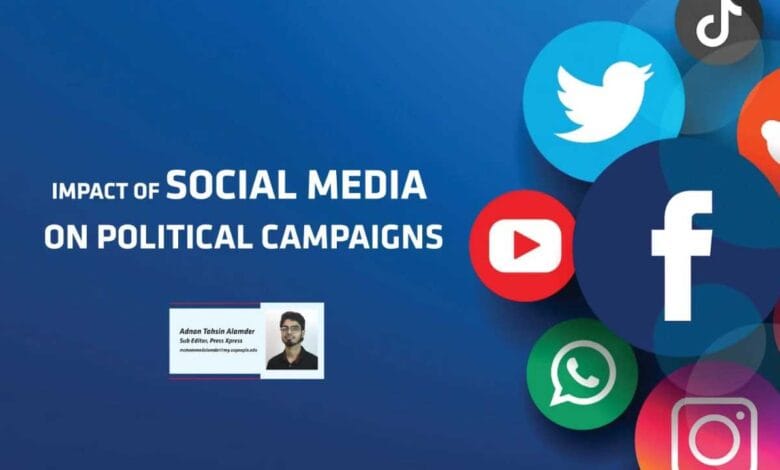
Why Has Social Media Affected Political Campaigns in Modern Times
Social media is one of the most effective instruments in contemporary politics since it has completely changed political campaigns. In ways that were previously unthinkable, politicians can now interact with voters instantly, reach large audiences, and even change public opinion. Traditional campaign techniques are being redesigned in the environment created by the platforms, which include Facebook, Instagram, TikTok, and Twitter. However, what has caused social media to have such a significant impact on contemporary political campaigns? Let’s take a closer look to comprehend this.
The Changing Dynamics of Political Campaigns: The Role of Social Media

Traditional media, such as radio commercials, television advertisements, and printed materials, used to dominate political campaigns. Despite their effectiveness, these tools’ reach and immediacy were constrained. Social media has now removed these obstacles, enabling politicians to interact in real time and directly with voters. Social media platforms, which offer previously unheard-of access and control over messaging, have emerged as the new arena for political influence.
Examine how social media has affected campaign tactics:
| Platform | Usage in Political Campaigns | Voter Reach & Engagement |
| Targeted ads, candidate updates, issue advocacy | 2.89 billion users worldwide | |
| Quick updates, direct voter interaction, live commentary | 400 million active users | |
| Visual messaging, campaign storytelling, influencer partnerships | 1 billion active users | |
| TikTok | Viral video content, engaging younger demographics | 1 billion active users |
| YouTube | Political speeches, debates, interviews, ads | 2.68 billion users worldwide |
The platforms have made campaigning more immediate, interactive, and data-driven, from Facebook’s personalized ads that target particular voter segments to TikTok’s viral nature. To reach voters, politicians are no longer limited to using traditional media. Politicians now have another way to manage their public image, interact with voters, and even inspire them to take action thanks to social media.
Social Media’s Power to Influence and Mobilize Voters
The ability of candidates to directly influence and mobilize voters is one of the most important ways that social media impacts political campaigns. Politicians no longer need to rely on TV broadcasters or wait for news cycles to spread their messages. Candidates can instantly reach millions of people with a single tweet or Facebook post.
Additionally, social media sites provide advanced voter mobilization tools. Data analytics are used by campaigns to find potential supporters, target them with advertisements, and persuade them to cast a ballot. Social media makes it simpler to create a sense of urgency and community, whether it is through live chats with voters, the creation of viral content, or reminders.
The Power of Micro-Targeting
Micro-targeting, a strategy that enables campaigns to send customized messages to particular voter segments, is now available. Voters are now viewed as unique audiences with varying interests, values, and demographics rather than as a single, homogenous group.
A political campaign could, for instance, focus on older voters with content about healthcare reform and target younger voters with messages about climate change. Political campaigns now have an unprecedented amount of control over how they interact with various groups thanks to the ability to create customized messages.
The Impact of Influencers and Content Creators in Political Campaigns

Political campaigns now have a new dimension thanks to the rise of social media influencers. Influencers, or those with sizable social media followings, are now effective instruments for influencing public opinion. Compared to traditional politicians or media outlets, these influencers frequently have greater control over their audiences. Their support or opposition can alter a campaign’s course.
Why Politicians Turn to Influencers
Politicians can reach audiences that might be difficult to reach otherwise by collaborating with influencers. These influencers work especially well at reaching younger voters, who are typically more difficult to persuade to cast ballots. Influencers can market a candidate’s platform in a way that is less like traditional advertising and more personal by creating relatable and genuine content.
Influencers have the following effects on campaigns:
| Election Cycle | Key Influencer Role | Voter Impact |
| 2020 U.S. Election | Influencers like Cardi B and The Rock endorsed candidates | Increased engagement among young voters |
| 2016 U.S. Election | Celebrities and YouTubers supported Clinton and Trump | Created viral moments and debates online |
| Brexit Vote | Influencers used platforms to sway young voters | Mobilized youth vote to participate |
Influencers are a crucial component of contemporary campaigns because they drive engagement and help shape the narrative. Naturally, though, this also calls into question the veracity and openness of political endorsements.
The Challenges: Misinformation and Social Media
Social media has its negative aspects, even though it can also be a tool for constructive engagement and mobilization. One of the biggest problems facing political campaigns today is the proliferation of false and misleading information on social media. Confusion and a lack of faith in the democratic process can result from the rapid spread of false narratives, deceptive advertisements, and viral fake news stories.
The Dangers of Misinformation
Information on social media is especially prone to distortion because of how quickly it spreads. False information can easily go viral, influencing voters’ perceptions of candidates, parties, and policies. Malicious actors have occasionally used these platforms to disseminate purposeful false information in an effort to sway election results.
Misinformation has far-reaching effects. It has the power to erode election legitimacy, influence unsure voters, and sow discord in society. Despite efforts by social media companies to combat fake news, the challenge remains significant.
How Social Media Has Changed the Nature of Campaign Strategy
The way political campaigns are conducted has been drastically changed by social media. Candidates no longer have to rely on costly TV commercials or wait for media attention to spread their message. Rather, campaigns now use social media platforms to communicate with voters in real time. Candidates can respond to crises, modify their messaging, and even change their campaign tactics as necessary thanks to this instant feedback loop.
Social media has also made political campaigns more accessible. These days, smaller campaigns can use the same resources as more well-funded, larger ones. This level of access has leveled the playing field, allowing a broader range of candidates to participate in the political process.
The Future of Social Media in Political Campaigns

Social media will continue to play an increasingly important role in political campaigns. We can anticipate even more creativity in the way candidates engage with voters on social media as technology develops. Future campaigns will be even more individualized and focused due to the growing sophistication of AI and data analytics. But there will also be new difficulties as a result, particularly with regard to data security, privacy, and political advertising regulation.
Considering social media’s immense power, we also need to think about how it affects democracy. Social media can increase voter turnout, but it can also increase political polarization and disseminate false information. As we move forward, it will be crucial to strike a balance between leveraging the benefits of social media and mitigating its potential harms.
Final Thoughts
For better or worse, social media has permanently altered the political campaign landscape. In ways that traditional media was never able to, it has increased the immediacy of political discourse, created new channels for voter engagement, and provided candidates with direct access to their constituents. It has become an essential tool in contemporary elections due to its capacity to microtarget voters, shape opinions in real time, and create individualized connections.
However, there are drawbacks to social media’s rise as well, mainly in relation to the dissemination of false information, swaying public opinion, and the moral ramifications of targeting vulnerable populations. These issues will probably change as technology develops, calling for greater openness, improved regulation, and a continuous discussion about the place of social media in democracies.
Q & A: Frequently Asked Questions
Q1: What effect does social media have on political campaign voter engagement?
A1: Direct communication between candidates and voters is made possible by social media, which facilitates voter engagement, information sharing, and mobilization. It enables campaigns to use customized messaging to target particular demographics, thereby promoting voter turnout.
Q2: How do political campaigns use influencers?
A2: By promoting messages in a genuine and intimate manner, influencers assist candidates in reaching younger, more interested audiences. Their support has the power to change public perception and boost turnout.
Q3: During elections, how can false information proliferate on social media?
A3: Because social media platforms move quickly, false information has the potential to spread widely. Voters’ decisions can be influenced by the rapid spread of false information, deceptive political advertisements, and fake news articles.
Q4: Can voter turnout be increased through social media?
A4: By offering resources like polling place information, encouraging voting, and providing real-time updates, social media can indeed boost voter turnout. It works especially well to reach younger voters.
Q5: What difficulties do campaigns encounter when utilizing social media?
A5: Misinformation, privacy issues, and the possibility of echo chambers—where voters only see content that supports their opinions—are some of the difficulties that campaigns face. Furthermore, the ongoing requirement for engagement and content production can be resource-intensive.
Q6: What makes social media in politics more powerful than traditional media?
A6: Unlike traditional media, social media enables direct, real-time communication with voters. Additionally, it makes campaigns more effective by allowing them to specifically customize their messaging for various voter segments.
Q7: What impact will social media have on upcoming elections?
A7: As technology advances, social media will further integrate with virtual platforms, data analytics, and artificial intelligence. Better regulation is necessary to prevent misuse, even though it will increase mobilization and engagement.





